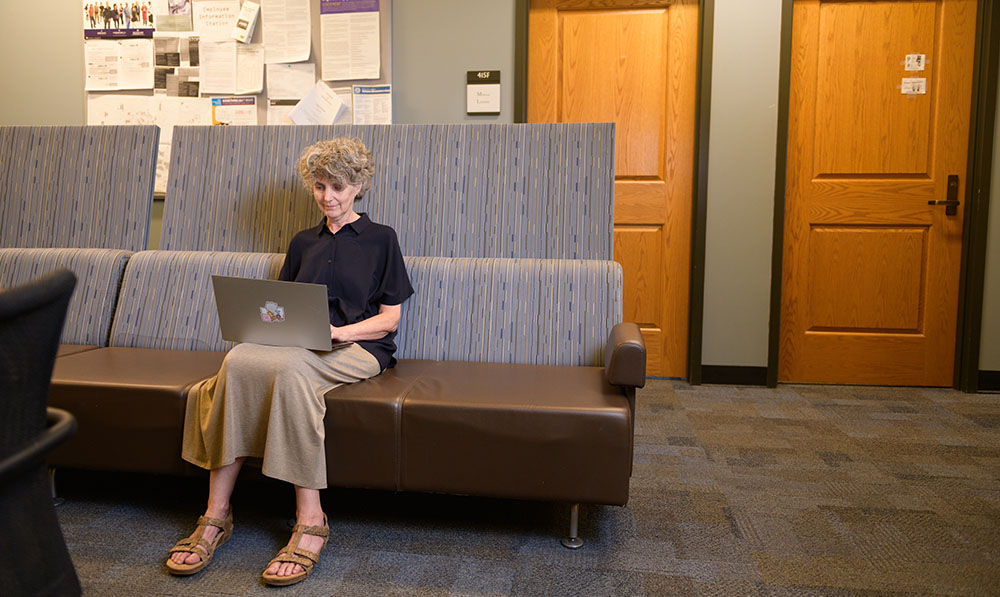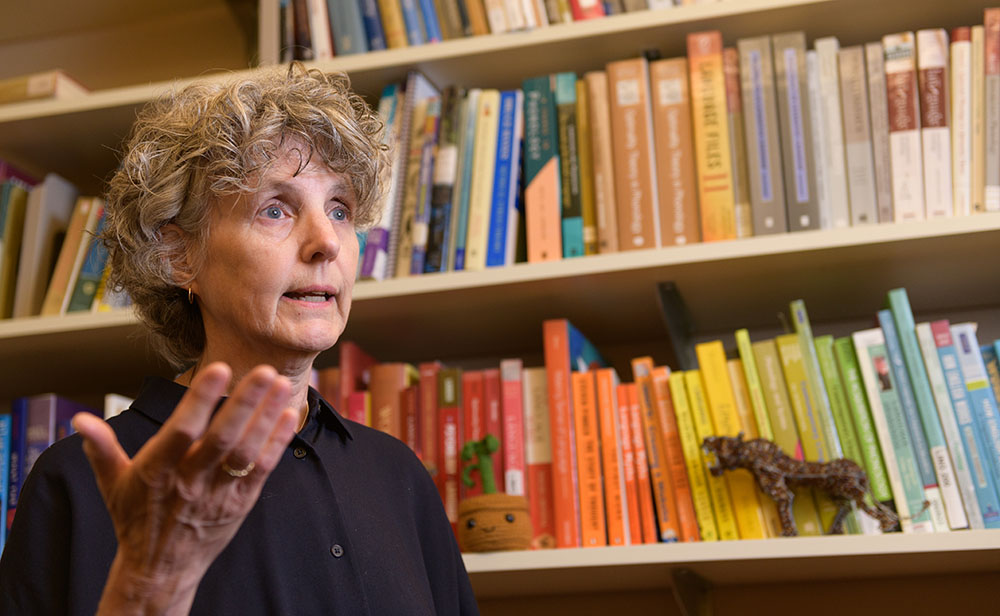Summer Sessions at the University of Washington, with more than 1,000 credit courses in more than 100 fields of study, are open to everyone and offer something for all students. Summer Sessions also provide faculty members like Lorna Rozelle with an opportunity to team up with UW Continuum College to develop online courses like Linguistics 234: Language and Diversity that increase accessibility to all students, no matter when or where they’re learning.
Lorna Rozelle, lecturer in the UW Department of Linguistics, began her Summer Sessions class — Linguistics 234: Language and Diversity — with a simple but fundamental question.
“‘Do I have an accent?’” Lorna asks the class.
No matter where you’re from or how you speak, the answer is yes — even an accent deemed “neutral” and fit for the evening news still represents a specific dialect. Everyone has a dialect, and, according to linguists, all dialects are created equal.
But, of course, in everyday life, dialects are fraught with meaning and cultural connotations.

“To linguists, all dialects are as good as another — they’re all considered these beautiful products of the human mind,” Lorna says. “But due to social or political facts, or even accidents of history, one dialect might be considered more prestigious than another.”
As Lorna’s students learn about language diversity, they encounter the idea of “language endangerment,” which naturally leads to vibrant discussions of how linguistic diversity “intersects with other aspects like politics, education, gender, health, identity and so on,” Lorna says.
With help from the American Sign Language (ASL) faculty in the UW Linguistics department, Lorna incorporates sign language as a thread running through LING 234, highlighting the ways people can wield language as a tool of persecution.
“Speakers of minority languages like ASL have faced a history of oppression that is similar to the stories of many other oppressed people across history,” Lorna says.
Including Outside Perspectives
Students in LING 234 learn more than just the nuts and bolts of ASL; they also attend guest lectures from speakers like Lance Forshay, UW teaching professor and ASL language director, which illuminate the rich community of deaf people in the United States.
"Students come to appreciate and respect the diversity of language. Since language is such a fundamental part of being human, that respect for the diversity of language translates into a respect for every human being."
Katie Ruesink, a UW undergraduate in her final year of a double major in Korean and Middle Eastern Languages, was interested in LING 234 because it focused on the theory, history and context behind the languages she was learning. Because Katie’s studies had taken her overseas, the asynchronous format also fit her schedule.
“I was abroad last year in Korea and needed to take a Summer Sessions course, so this was perfect for me, especially since the time difference was not going to work out with a synchronous class,” Katie says. “I'd been taking a lot of language classes, but I hadn't taken a theory class before, so from the start that was very appealing to me.”
By digging into the theory and history of our shared linguistic experiences and traditions, Lorna and students like Katie create a supportive environment where everyone can belong — ultimately allowing language to unlock a better understanding of other perspectives.
The class’s section on Indigenous language access and the language’s connection to the land “provided a moment of hope and showed just how powerful language is, which is the main message I took away from the class,” says Katie. “I felt like part of a larger community of people who valued language diversity, language access efforts and education.”
“The students come to appreciate and respect the diversity of language,” Lorna says. “Since language is such a fundamental part of being human, that respect for the diversity of language translates into a respect for every human being.”
Making Language Accessible to All
In a class dedicated to communication, it was important that Lorna’s Language and Diversity course was accessible to all — which was the impetus for turning LING 234 into an asynchronous online course for Summer Sessions.
"A learning experience needs to be inclusive for different types of learners...This strategy supports learners no matter where they are in the world, their learning process is or their learning needs for an online course."
Lorna had taught the course remotely during the pandemic but felt she could improve upon the course’s asynchronous format. Enter UW Continuum College’s Learning Experience (LE) team, who worked with Lorna to turn LING 234 into the most accessible class possible.
“I’ve had disabled students who have difficulty getting to campus or who find it helpful to do the work and listen to the lectures when it works best for them,” Lorna says. “This summer, I had one mother say, ‘This is great for me because I can work around my children’s schedule.’”
The LE team’s job was to retain the dynamism of Lorna’s in-person classes in the asynchronous format, ensuring that students could grasp the concepts, no matter their learning preference.
“A learning experience needs to be inclusive for different types of learners, and with this course in particular, the learning experience is really integral to how accessible it is,” says the LE team’s Kimberly K'uh Hollins, noting that every image used in the course must be accessible for screen readers, for example. “This strategy supports learners no matter where they are in the world, their learning process or their learning needs for an online course.”
Bringing the Classroom to Life Online
The LE team and Lorna collaborated to create a dynamic and meaningful experience in the asynchronous format, ensuring they didn’t lose the potency and power of lectures from speakers like Professor Forshay in translation.
“Lance’s lectures are always amazing in person, but in the past, I’d found it hard to capture that on video,” Lorna said, noting the voiced interpretation needed to be synched closer to the actual signing, so that students could see signed examples about the same time they were voiced on video. “We had such great interpreting, and I wanted it captioned as it was being signed, as well as into spoken English — and the LE team was able to do that for me.”

Katie found Lance’s videos brought an important point of view to the study of ASL: “Getting a deaf perspective is so valuable,” she says, “especially when you’re coming from a place of knowing some ASL but not knowing the practical, everyday usage.”
Lorna has seen firsthand that exposure to the diversity of language — and the different global perspectives accompanying exposure to a new culture — has helped her students see their daily lives in new ways.
“One student mentioned when his brother spoke in African American Language, his grandmother was always trying to correct him,” Lorna says. “After taking this class, he had an understanding and appreciation where he was able to say, ‘My brother was speaking another dialect.’”
Each dialect, each “fabulous product of the human mind,” as Lorna calls them, tells a story. Now, thanks to the hard work of Lorna and Continuum’s LE team, students can explore these dialects and the stories they tell, no matter where they are or how they learn.
